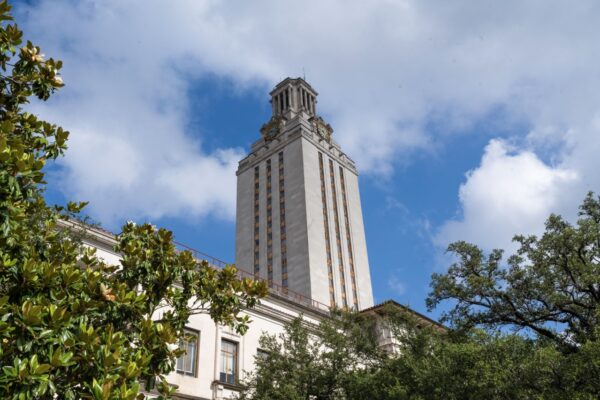Please see below for questions and answers regarding recent campus protest activity and the University’s response.
Statements from the University since April 24:
Wednesday, April 24
UT Division of Student Affairs Statement
President Hartzell Message: Today’s Events
Thursday, April 25
President Hartzell Message: Balancing Speech, Safety and Our Mission
Monday, April 29
University Statement Regarding Today’s Ongoing Events on Campus (afternoon)
University Statement Regarding Today’s Protest Events (evening)
Tuesday, April 30
University Statement Regarding Arrests from Monday’s Protests and Confiscation of Weapons
Is peaceful protest allowed at UT Austin?
UT Austin actively supports free speech and peaceful protests, which happen regularly on campus surrounding various issues. Since October 2023, community members have hosted more than a dozen pro-Palestinian free speech events and protests that have been largely without incident. Protests, however, must comply with Institutional Rules and policies about time, place and manner, one of which is that no one may create or attempt to create an encampment. When a protest violates Institutional Rules, protesters are told to disperse.
What makes the recent protests on April 24 and April 29 different from others held throughout the year?
Most protests on the UT Austin campus, including those held since October related to events in the Middle East, have complied with Institutional Rules that exist to keep the entire campus community safe and protect our operational integrity. On April 24, those planning the event expressly stated their event was intended to disrupt our operations and to “follow in the footsteps” of protesters at other universities where those protesters successfully accomplished that same goal. Their promotion of their intended event included planned activities and conduct in violation of our policies and rules. Also, on both April 24 and April 29, as they indicated they intended to do, protestors violated numerous Institutional Rules and policies — most notably, setting up encampments on the South Lawn. In addition, protesters deliberately provoked officers, stated their intent to not comply, and physically and verbally harassed our staff. Officers were headbutted, spit on, and verbally assaulted by protesters. Some protesters attempted to startle a DPS horse, and others threw horse excrement at officers. Police car tires were slashed.
Which Institutional Rules have been violated?
The following violations of Institutional Rules and policies were associated with the April 24 and April 29 protests:
- Erecting tents (HOP 8-1050)
- Attempting to establish an encampment (HOP 8-1050)
- Unauthorized use of amplified sound (Sec. 13–801)
- Unauthorized use of tables on the South Lawn (Sec. 13-600)
- Use of face coverings to conceal identity (Sec. 13-105)
- Failure to identify (Sec. 11-402)
- Failure to comply with directives related to the above referenced (Sec. 11-402)
- Shoving staff (HOP 8-1010)
- Items brought that could be used as weapons (e.g., guns, shields, objects intended for throwing, mallets) (Sec. 11-402)
- Failure to follow city, state and federal laws (e.g., criminal trespass, disorderly conduct, destruction of government property, assault on public servant, obstructing a roadway)
Why were people arrested?
Arrests can be made when protesters repeatedly violate Institutional Rules and refuse to comply with University directives. When an individual refuses to comply, they are criminally trespassing.
During the protests on April 24 and April 29, protesters were arrested for trespassing after they were told several times by UT staff and law enforcement to disperse from the protest site. UT has consistently said that encampments are not allowed, and the City of Austin also prohibits public camping. When protesters set up encampments in violation of policy and then refuse to take those encampments down and disperse, law enforcement can make arrests for criminal trespassing.
Why was the Texas Department of Public Safety brought onto campus to support UTPD?
The University requested assistance from DPS because, prior to the April 24 protest, the protesters indicated that they wanted to mimic what has happened at Columbia University and other universities. Based on the size of the groups that have protested elsewhere, the University expected a group too large for the UT Police Department to respond to on its own, if that were to become necessary.
Were there any warnings to protestors before they began to act?
Leading up to the April 24 protest, organizers expressed an intent to “follow in the footsteps” of demonstrations occurring at Columbia University, Rutgers-New Brunswick, Yale and elsewhere. The event called for actions that violated our Institutional Rules and policies and was part of a national campaign by a group not affiliated with UT Austin. That group, Students for Justice in Palestine, is explicitly seeking to disrupt university operations nationwide and create campus encampments. A UT-affiliated student group, the Palestine Solidarity Committee (PSC), was also involved in planning the protest. The Dean of Students’ Office (DoS) reached out to the PSC several times in the weeks leading up to the April 24 protest, and, after agreeing to a meeting, PSC members chose to no-show. DoS also sent a letter informing PSC that the event could not proceed as planned because of its stated intent to disrupt and therefore break Institutional Rules. The DoS offered support for an event within University rules.
On April 23, University staff provided a notice to the student group that their event could not proceed as planned. The group did not respond to indicate that they would adjust their plans to be within the rules. Instead, they showed up on campus on April 24 and immediately began to proceed with conduct (e.g., amplified sound) that demonstrated their intent to ignore Institutional Rules. At that point, University staff directed the group multiple times that they needed to disperse. Instead of complying, several in attendance ignored the directive and some stated they would not comply. At that point, University staff sought assistance from UTPD and other law enforcement.
On April 29, protesters set up encampments, and University staff told them several times that they had to disperse because their encampments violated Institutional Rules. Law enforcement became involved when protesters refused to remove encampment materials and leave the premises.
Why was the Palestine Solidarity Committee (PSC) suspended?
The Dean of Students (DoS) suspended PSC for violating and openly advocating for others to violate Institutional Rules and policies, as well as failing to comply with the DoS attempts to intervene and adhere to direction from law enforcement.
Are all the protesters affiliated with UT Austin?
Of the 79 people arrested on April 29, 45 had no affiliation with UT Austin. Of the 55 people arrested on April 24, 26 had no affiliation with UT Austin.
At what point did officers decide to make an arrest?
Protesters participating in demonstrations that violate Institutional Rules and policies — such as demonstrations that include encampments — have been given numerous chances to comply with our Institutional Rules to disperse without arrest. Those who refused those numerous chances have been subject to arrest for trespassing. Officers have made every attempt to arrest protesters peacefully. If protesters followed the University’s time, place and manner provisions for protest, then they would not be directed to disperse and would be able to engage in their expressive activities on campus.
Were any weapons found during the protests?
To date, from protesters, weapons have been confiscated in the form of guns, buckets of large rocks, bricks, steel-enforced wood planks, mallets, and chains. Guns, specifically, were confiscated by Austin Police Department officers, and these weapons were not in a holster. UTPD is currently reviewing the evidence to determine if additional arrests should be made or further charges filed for individuals bringing guns on campus without a license (Texas Penal Code, Section 46.03).
Why did some officers use pepper spray and flash bangs?
During the protest on April 29, protestors prevented law enforcement from doing their jobs. The protesters repeatedly encroached on and attempted to push back barriers formed by police officers to protect public safety, refused to move out of the street, and were blocking official law enforcement vehicles that were attempting to leave campus with protestors who were arrested, which is a violation of the Texas Penal Code, Section 42.03.
What consequences do arrested students face from UT Austin?
It is first important to distinguish the campus conduct process from the legal process. Separate from any discipline a student might face from the criminal justice system, a student arrested for criminal trespassing or other rules violations is also subject to student conduct action based on University rules. The administrative process is designed as an educational intervention, supporting due process and evidence-based sanctions/activities, and providing accountability. The criminal justice system process can run parallel with any student conduct action.
Further explanation about our student conduct process can be found here.
The University historically does not initiate the student conduct process with students just before or during final exams, to avoid having an impact on academic performance. We want to be proportionate in our response, and it takes time to gather facts and conduct investigations. Based on both factors, no conduct actions have been issued related to events of the past week.




